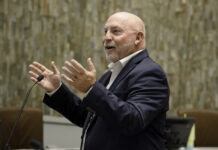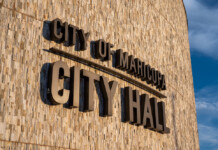
Republicans Steve Smith, Maricopa, and Adam Kwasman, Tucson, were sworn in at noon Monday as the first delegation for the newly created District 11 in the state House of Representatives.
For Smith, who ran for the House because of redistricting after serving a term as state senator, Monday marked the first day of “the same job, just a different building.”
“I certainly think my experience is going to help,” he said.
“The House has a lot of new members this year, and it’s important that … new members see those who have been there a bit longer really hold (their) ground and stand for the very important things,” Smith said.
One lesson he learned as a senator and takes with him into the House is: “Sometimes, if your bill has to die for the greater good, you need to learn that and understand that.”
A challenge Smith said he sees on the horizon is potential fights over gun control legislation.
The topic has been brought to the forefront of state legislatures nationwide in the wake of December’s mass shooting at Sandy Hook Elementary School in Newtown, Conn. Twenty children and six adults were killed. The shooter shot himself.
“This session, because of some of the gun issues we’ve seen around the country, already there’s some significant discussion on both sides,” Smith said. “I think that’s going to be a pretty significant battle out of the gate from some of the bills that I’ve seen that have been dropped already.”
Smith said he plans to continue working for immigration reform.
As a first-term senator last session for District 23, he introduced a bill proposing a border fence built by prisoners and funded through donations made on a website.
As a state House member, Smith said he planned to endorse bills that help identify illegal immigrants in hospitals and public schools.
The budget “is always a bone of contention,” he said, adding he did not think this session would be any different.
As for fiscal policy, Smith and Kwasman said they worry about the impact the Affordable Care Act – also known as Obamacare – will have on the state budget, which Smith said currently has a $450 million surplus.
“The idea was that if Obamacare is not implemented, a lot of that money was going to go to education,” Smith said. “Unfortunately, a big part of that money is probably going to find its way into the Obamacare pool, which again, I think is unfortunate.”
Kwasman said, “We have to make sure that a free market reigns in health care in this state.”





![Elena Trails releases home renderings An image of one of 56 elevation renderings submitted to Maricopa's planning department for the Elena Trails subdivison. The developer plans to construct 14 different floor plans, with four elevation styles per plan. [City of Maricopa]](https://www.inmaricopa.com/wp-content/uploads/2024/04/city-041724-elena-trails-rendering-218x150.jpg)
![Affordable apartments planned near ‘Restaurant Row’ A blue square highlights the area of the proposed affordable housing development and "Restaurant Row" sitting south of city hall and the Maricopa Police Department. Preliminary architectural drawings were not yet available. [City of Maricopa]](https://www.inmaricopa.com/wp-content/uploads/2024/04/041724-affordable-housing-project-restaurant-row-218x150.jpg)

![City looks to lower property taxes again City Manager Ben Bitter speaks during a Chamber of Commerce event at Global Water Resources on April 11, 2024. Bitter discussed the current state of economic development in Maricopa, as well as hinting at lowering property tax rates again. [Monica D. Spencer]](https://www.inmaricopa.com/wp-content/uploads/2024/04/spencer-041124-ben-bitter-chamber-property-taxes-web-218x150.jpg)



![Alleged car thief released without charges Phoenix police stop a stolen vehicle on April 20, 2024. [Facebook]](https://www.inmaricopa.com/wp-content/uploads/2024/04/IMG_5040-218x150.jpg)



![MHS G.O.A.T. a ‘rookie sleeper’ in NFL draft Arizona Wildcats wide receiver Jacob Cowing speaks to the press after a practice Aug. 11, 2023. [Bryan Mordt]](https://www.inmaricopa.com/wp-content/uploads/2024/04/cowing-overlay-3-100x70.png)
